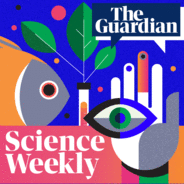Scientists are beginning to understand that ageing is not simply a linear process and we age, according to recent research, in three accelerated bursts: at about 40, 60 and 80 years old. In this episode from July, Ian Sample talks to Stanford University’s Prof Michael Snyder, who explains what the drivers of these bursts of ageing could be, and how they might be counteracted. Help support our independent journalism at theguardian.com/sciencepod

Wissenschaft & Technik
Science Weekly Folgen
Twice a week, the Guardian brings you the latest science and environment news
Folgen von Science Weekly
299 Folgen
-
Folge vom 23.12.2025Revisited: why do we age in dramatic bursts, and what can we do about it?
-
Folge vom 18.12.2025Life beyond Earth? Dame Maggie Aderin-Pocock on the mysteries of spaceDame Maggie Aderin-Pocock is a space scientist and science educator who has worked on a number of instruments that are revolutionising our view of the cosmos, including the James Webb Space Telescope. This year she will be giving the Royal Institution Christmas lectures, Britain’s most prestigious public science lectures, in which she will be exploring some of the big questions space science still has to answer. Nicola Davis sat down with Dame Maggie to discuss the lectures, why she is convinced there is life beyond our planet, and her dream of journeying to a distant exoplanet. Madeleine Finlay hears from them both in this Christmas special edition of Science Weekly.. Help support our independent journalism at theguardian.com/sciencepod
-
Folge vom 16.12.2025What’s worse for us, sugar or sweeteners?We all know eating too much sugar is bad for our health – but would we be better off replacing it with artificial sweetener? It’s a question Science Weekly listener Marion posed recently and, as Madeleine Finlay tells Ian Sample, the answer is complicated. She explains what the science says about sugar v sweeteners with the help of Prof Havovi Chichger, from Anglia Ruskin University, and Prof Jim Krieger, from the University of Washington’s school of public health. Help support our independent journalism at theguardian.com/sciencepod
-
Folge vom 13.12.2025The Birth Keepers: I choose this, episode oneThe Free Birth Society was selling pregnant women a simple message: they could exit the medical system and take back their power by free birthing. But Nicole Garrison believes FBS ideology nearly cost her her life. This is episode one of a year-long investigation by the Guardian journalists Sirin Kale and Lucy Osborne Listen to the full series from The Guardian Investigates podcast. Help support our independent journalism at theguardian.com/sciencepod
